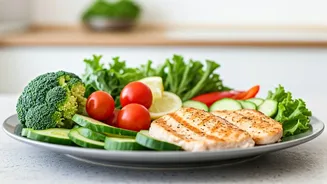Prioritize Hydration
Consuming sufficient water is fundamentally important for anyone looking to lose weight. When one is properly hydrated, their metabolism works optimally.
Water also helps in making you feel fuller, reducing the likelihood of overeating. People frequently confuse thirst with hunger; drinking water before meals can help control food intake. Aim to drink at least eight glasses of water each day. Consider keeping a water bottle handy at all times to prompt frequent sips. You could also add some fresh fruit slices like lemon or cucumber to add some flavor to it, which will help you drink even more.
Embrace Portion Control
Portion control is crucial for weight loss success. It is the simplest and most effective method for regulating calorie consumption. Using smaller plates and bowls can immediately curb excessive consumption. Be mindful of the sizes of the portions when eating meals at home. Avoid eating directly from large containers, which may cause you to consume more than intended. Planning your meals ahead of time can also assist you in managing portion sizes. Also, before reaching for a second helping, wait 15–20 minutes, giving your body time to signal if you are satisfied. This approach reduces unnecessary calorie intake and supports overall weight reduction.
Choose Nutrient-Dense Foods
The quality of the food you eat significantly impacts weight reduction. Instead of filling up on empty calories, include nutrient-rich foods into your diet. Foods high in nutrients are also usually low in calories. Focus on including an abundance of fruits and vegetables, which are rich in vitamins, minerals, and fiber. Lean proteins, like chicken, fish, and legumes, help build and repair muscles and keep you full longer. Select whole grains over refined grains because they contain more fiber, which helps regulate blood sugar levels and promotes satiety. Eating nutrient-dense foods provides your body with important nutrients and sustains your weight loss goals.
Schedule Regular Meals
Establishing a regular meal schedule can significantly aid your weight loss efforts. Eating at predictable times helps regulate your metabolism and prevents overeating. Skipping meals can lead to hunger and poor food choices later. Aim to eat three meals a day at regular intervals. Adding healthy snacks between meals can help you avoid extreme hunger and maintain consistent energy levels. Having a structured meal schedule also helps in meal preparation. Planning your meals helps to make healthier options and helps prevent impulse eating. Consistency in your eating schedule supports a healthier metabolism and makes weight management more manageable.
Incorporate Physical Activity
Regular physical activity is an important element of a weight loss plan. Exercise assists in burning calories and improving overall fitness. Start with activities that you like, such as walking, jogging, swimming, or cycling, to make it sustainable. Aim for at least 150 minutes of moderate-intensity exercise, or 75 minutes of vigorous-intensity exercise, each week. In addition to cardio, consider incorporating strength training exercises to build muscle. Muscle tissue burns more calories at rest than fat tissue, increasing your overall metabolism. Incorporate physical activity into your daily routine to enjoy more benefits of weight loss and enhanced physical health.
Prioritize Quality Sleep
Getting adequate sleep is a crucial but sometimes neglected part of weight loss. Sleep deprivation can affect hormones that regulate hunger and satiety, like ghrelin and leptin. Poor sleep can lead to increased appetite and cravings for unhealthy foods. Aim for seven to eight hours of sleep each night to help manage weight and other health factors. Establish a calming bedtime routine to promote better sleep quality. Avoid caffeine and alcohol before bedtime, and create a comfortable sleep environment that is quiet, dark, and cool. Getting enough sleep enables hormonal balance, better controls appetite, and encourages effective weight management.
Track Your Progress
Keeping a record of your progress is important for staying motivated and ensuring that you're making progress. Tracking your food intake and exercise habits helps you stay accountable. Keep a food journal or use a mobile app to document your daily meals and calories. Monitor your weight regularly to monitor your body's modifications. Note any changes you see in your energy levels and general well-being. Celebrate your accomplishments, even if they are tiny. Evaluating your progress frequently helps you adjust your strategies as needed and maintain your motivation. This helps you stay committed to your weight loss and promotes long-term success.















